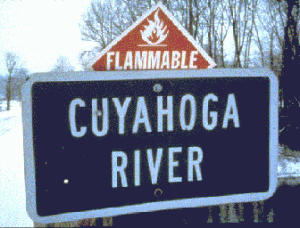 Many years ago when I lived in Cleveland, Ohio I witnessed a futile effort of diminishing returns. The Cuyahoga River, a bastion of industrialization had emptied its polluted waters into Lake Erie for more than a century. The river had become famous when it literally caught on fire and Lake Erie gained notoriety when it was pronounced DOA due to the loss of oxygen in the water caused by the pollution from the Cuyahoga River. In a declaration by city, state and federal governments, industrial giants with facilities along the river were ordered to upgrade their discharge water into the river to the quality of drinking water. Ninety-five percent of the discharge water into the river cost as much to process and clean as the remaining five percent. In other words, the smallest volume of water required by far, the largest portion of the cost.
Many years ago when I lived in Cleveland, Ohio I witnessed a futile effort of diminishing returns. The Cuyahoga River, a bastion of industrialization had emptied its polluted waters into Lake Erie for more than a century. The river had become famous when it literally caught on fire and Lake Erie gained notoriety when it was pronounced DOA due to the loss of oxygen in the water caused by the pollution from the Cuyahoga River. In a declaration by city, state and federal governments, industrial giants with facilities along the river were ordered to upgrade their discharge water into the river to the quality of drinking water. Ninety-five percent of the discharge water into the river cost as much to process and clean as the remaining five percent. In other words, the smallest volume of water required by far, the largest portion of the cost.
Selling has a very similar relationship to volume and money. There is a disproportionate allocation of effort to results. Far too many salespeople spend the majority of their time doing those things that produce the least results. Salespeople often work hard at doing those things that generate the least amount of profit for their employer. One of the major culprits is due to the lack of following basic time management principles. This explains why the number one source of wasted time lies in spending more time to complete a task than it really requires. I’ll be conservative and suggest that the average salesperson wastes half their day by not managing time effectively. They spend too much time on unimportant things while they never have enough time to do all of the important activities.
In the early 1900’s the Italian economist Vilfredo Pareto created a mathematical formula that he used to explain the disproportionate distribution of wealth in his country. Today we refer to this formula as the Pareto Principle or simply, the 80/20 Rule. As it pertains to selling, we could say that salespeople spend 80% of their time and effort on those things that will produce only 20% of the value. Here is a list of several interpretations of the Pareto Principle applied to sales:
80% of your sales are made by 20% of your salespeople
80% of your profits come from 20% of your effort
80% of your profits come from 20% of your customers
80% of your complaints come from 20% of your customers
80% of your sales come from 20% of your product line
Salespeople need to spend their time doing those things that matter most if they are going to survive this seemingly endless recession. We all need to work smarter and harder at those things that will truly make a difference in our performance. Forget those activities that consume large amounts of time and effort for an insignificant return. Focus your efforts on higher return prospects. I’m not talking about bigger opportunities. I’m talking about playing better odds. For example, referrals vs. cold calls, dealing with decision makers vs. influencers, people who have a need vs. those who have an interest. Be mindful of the 80/20 Rule and strive to maximize your performance at all levels of your sales activities. There is no better time to be smart about selling than in the current economy.




Sorry, the comment form is closed at this time.